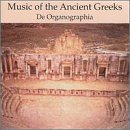| All Artists: Ensemble De Organographia, Anonymous, Athenaeus, Euripides, Limenius, Mesomedes, Research Composer, Philip Neuman Title: Music of Ancient Greeks Members Wishing: 1 Total Copies: 0 Label: Pandourion Release Date: 3/24/1997 Genres: Special Interest, Pop, Classical Styles: Vocal Pop, Opera & Classical Vocal, Chamber Music, Sacred & Religious Number of Discs: 1 SwapaCD Credits: 1 UPC: 096436100124 |
Search - Ensemble De Organographia, Anonymous, Athenaeus :: Music of Ancient Greeks
 | Ensemble De Organographia, Anonymous, Athenaeus Music of Ancient Greeks Genres: Special Interest, Pop, Classical
De Organographia: Philip Neuman, Gayle Stuwe Neuman and William Gavin combine astute musicology, performance practice and instrument crafting in the realization of this amazing collection of music from 500 BC to 300 AD. Fr... more » |
Larger Image |
CD DetailsSynopsis
Product Description De Organographia: Philip Neuman, Gayle Stuwe Neuman and William Gavin combine astute musicology, performance practice and instrument crafting in the realization of this amazing collection of music from 500 BC to 300 AD. From the most authentic known transcriptions, on period instrument reconstructions, the collection is frequently presented at conferences of The American Musicological Society. "...enjoy the fresh sound of seldom-heard instruments and melodies performed skilfully in this wonderful recording." - The Oregonian Similar CDs
|
CD ReviewsIn some ways, even better than "Musique de la Grece antique" 07/07/1999 (5 out of 5 stars) "This recording is at once more complete in its textual basis, more clear and bright in its production, and in many cases better performed, than the earlier recording "Musique de la Grece antique" by Atrium Musicae (Harmonia Mundi CD -- also sold by Amazon.com). It is a superbly done, even haunting recording. But though Gayle Neuman has a beautiful voice, she is but one singer -- and I miss the richness of the instrumentation and the vocal variety found on the earlier recording. But you can't beat the liner notes, or the photo of the instrument replicas that is included with the liner notes.I find it fascinating that Philip Neuman & Co., in reconstructing the original instruments for this recording, came up with very nearly the same tone colors that Atrium Musicae did with their reconstructions. So far as I know, there was no collaberation between the two groups -- least of all in their approaches to the ancient music. The Neumans and William Gavin sought a quasi-archaeological "authenticity"; Atrium Musicae, to infuse new life into the music through their own spirits. Comparing the results is like comparing the arrangements of the same song, "My Heart Will Go On", performed by Celia Dion and Kenny G: they seem alike, and yet very much unlike." Travel in Time with Ensemble De Organographia Sergey Lenkov | Mother Russia | 12/12/2005 (5 out of 5 stars) "To hear the music that maybe Alexander the Great or Julius Ceaser (or even Jesus Christ) had heard - it`s a miracle! And this re-creation of antique music sounds most lively and sincere for me (comparing with record by Atrium Musicae de Madrid). You could understand the ancient culture through spirituality and emotions of the ancient people. Philip Neuman and Gayle Stuwe Neuman play the music on the instruments re-created by their own hands. Ensemble De Organographia performs it in very colourful manner, so you could listen to this CD as to record of live folk world music, not as to dry academic experiment in archeology of music. Ensemble De Organographia re-created even Sumerian music. Their CD "The Music of Ancient Sumerians, Egyptians and Greeks" I also highly recommend for the lovers of the ancient music. You could find both CDs on www.northpacificmusic.com." Ensemble does it again! Kaoru Hiratsuka | 08/04/2007 (5 out of 5 stars) "The Ensemble de Organographia has done it again, successfully reconstructing surviving ancient Musical pieces from Greece. (Their other album covered Sumeria, Egypt and Greece.) As I stated in my review of their other CD, I'm a student of classical (i.e. ancient) Chinese music (which unlike Western music managed to survive virtually intact...to the point where Chinese musicologist/archaeologists can even play surviving ancient songs on Bronze age instruments excavated from tombs.) The Ancient Chinese scale is remarkably similar to the Greek scale. It has basically five notes: Do, Re, Me, So, and La. "Fa" is delibelately omitted since many Confucians thought this note drove men insane and allowed people to write "improper" music. (Interesting side light..."Fa" figures promanently in modern military music...listen to Sousa or German military marches sometime.) It's a logical conclusion to see that ancient Chinese and ancient Greek music would be remarkably similar...which they are. The Ensemble nailed the songs, playing them in the emotional, folk-music style in which these compositions were written. It's very important to realize that virtually all ancient music was first and foremost, folk songs. Even the religious songs were codified folk songs. There was very little "high-brow" music since, as today, it simply wasn't popular. And that is what all reconstructions, up until the Ensemble's suffered from...trying to play an ancient folk song like some obscure modern impressionsitic piece like you hear on the 2001 movie sound-track. (There were some experimental compositions in ancient times, but none surived in the West, and in China virtually nobody, unless they're a musicologist specializing in ancient music, plays or listens to them since like today, what is popular IS "popular" music...not experimental pieces. Both the Ensembles albums are such welcome breaks from other "high-brow" attempts at reconstruction which sounded either too much like a bad "Sword and Sandal" flick or too much like a piece by Richard Wagner. (Nothing against Wagner...it's just that ancient music sounds nothing like "Also Sprach Zarathustra.") In trying to reconstruct ancient Greek music its important to remember that philosophy and dialogues weren't boring for the Greeks...this was their popular entertainment. Plato wasn't a party pooper, and Aristotle didnt' have to be boring. Ancient Greek music was a living product of their vital culture. The Ensemble managed to capture that vitality nicely."
|

 Track Listings (23) - Disc #1
Track Listings (23) - Disc #1
